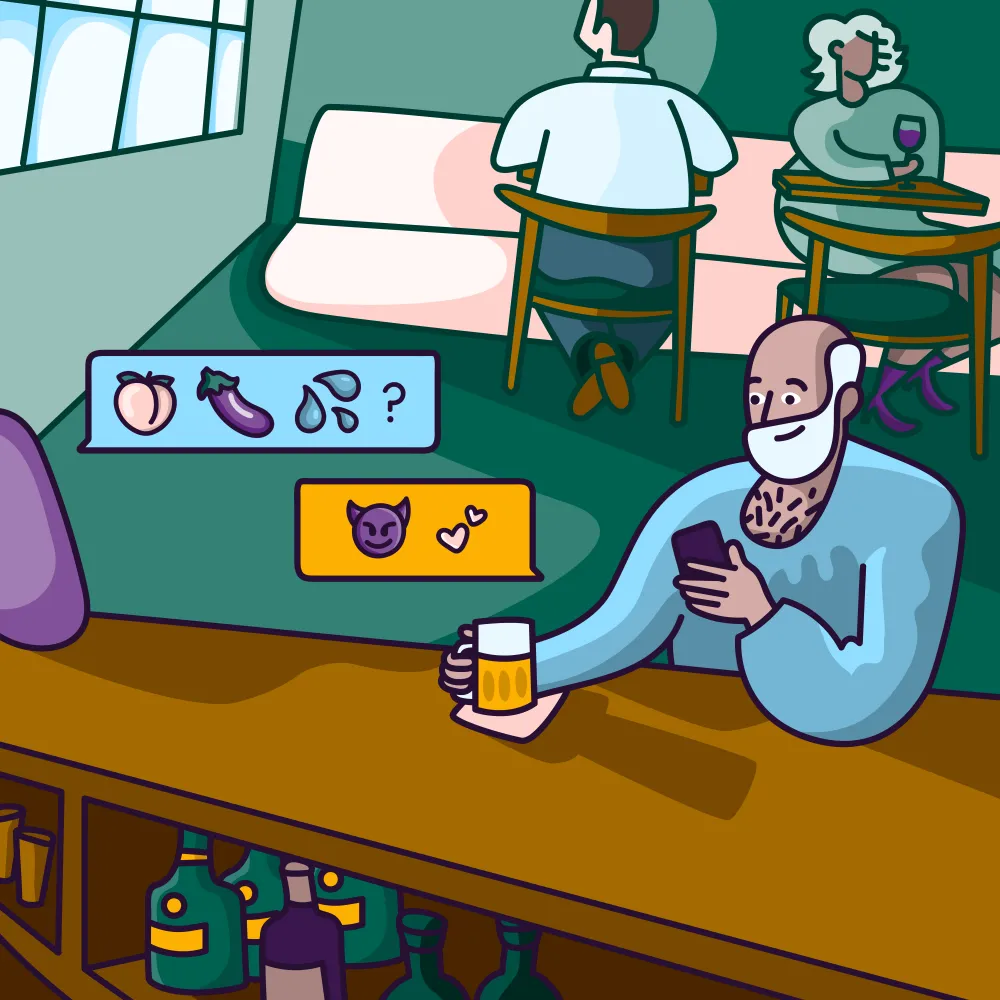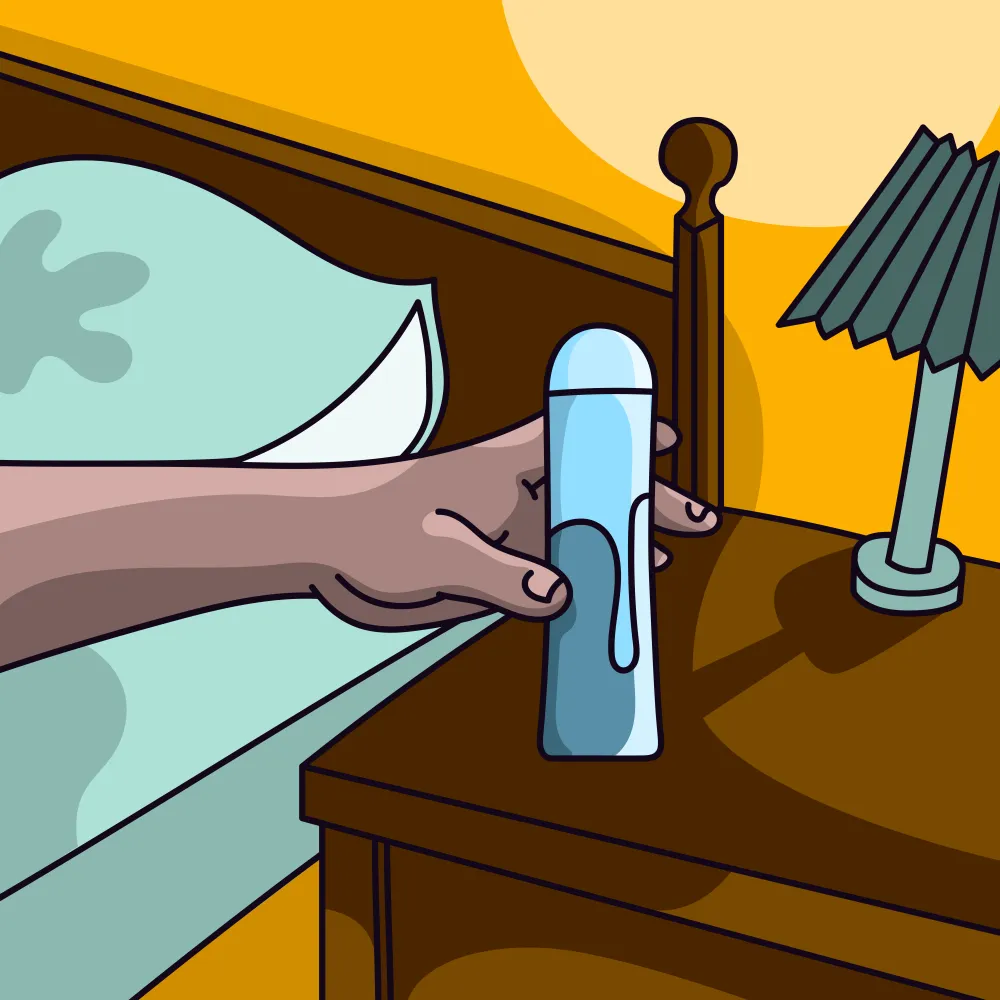For some people, coming out is easy and breezy. For others, it can take longer and be more complicated. Homophobia and stigma still unfortunately exist – these can make some guys uncomfortable being open about their sex and dating life.
On apps like Grindr you might come across blank profiles labelled "DL" or "discreet". But what should you know about dating or hooking up with them? And if you're still in the closet, how can you make sex safer?
Read on for Freddie’s guide to better sex and relationships, whether you’re DL yourself or dating someone who is.
What does DL mean?
The DL is short for “down-low”. It means when something is kept secret or hidden. In the queer community, it refers to men who identify as straight but have sex with other men.
Some DL men may be in relationships with women and having sex with or dating men on the side. Some may be single. Either way, they keep this part of their sex life a secret.
In gay slang, “DL” started as a term that referred to African-American men. It’s now more widely used and can refer to men of all races and ethnic backgrounds.
Is DL different from discreet?
On apps, some people may use “DL” and “discreet” to mean the same thing. They can also refer to different levels of secrecy and comfort with being “out”.
For example, someone who identifies as DL may be closeted. They might want to keep this part of their sex life a secret from everyone, including their partner. Someone who identifies as discreet may be out to their friends and family, but not want to be seen on apps like Grindr.
If someone uses “DL” or “discreet” on an app profile and you aren’t sure what they mean, you can always ask them.

Tips for DL guys
Everyone is on their own journey when it comes to being open about your identity. If you’re not ready to take that step, there’s no judgment here. There’s just a few things to bear in mind.
HIV and STIs can happen to anyone. If you’re DL or discreet, then staying on top of your sexual health with STI prevention, testing and treatment is still important. This applies whether you top or bottom.
Looking after your sexual health is essential if you have a partner who does not know about this part of your sex life. Remember that any risk you decide to take is also a risk you are deciding to take for them too – without their consent.
STI prevention
PrEP and condoms are both highly effective ways to prevent HIV when used as directed. PrEP can have a risk of reduced kidney function and bone density, but this risk is low. A recent study of 14,000 PrEP patients found 0.9% had these problems.
Condoms also help prevent STIs, and DoxyPEP can help reduce your risk for some bacterial STIs when taken after condomless sex. DoxyPEP is when you take the antibiotic doxycycline within 72 hours after sex but ideally within 24 hours. As with PrEP, it's essential to consult with a healthcare provider to discuss whether DoxyPEP is a good fit for you.
DoxyPEP can cause temporary digestive issues like nausea, but taking it with food can help. Some researchers have also cautioned that using doxycycline for DoxyPEP may increase the risk of antibiotic resistance, particularly when used inconsistently. Public health units are carefully considering these risks alongside the benefits of reducing STI transmission. DoxyPEP has been formally endorsed by America's Centers for Disease Control and Prevention and the Public Health Agency of Canada is currently conducting its review.
You can get PrEP or DoxyPEP from most sexual health clinics or family doctors, if they are familiar with LGBTQ2S+ health. If you are not comfortable using in-person services near you, then some clinics offer virtual care.
STI testing
Whatever prevention tools you use, it’s also important to get regular STI testing. If you don’t use condoms then you should get tested every three months. If you are on PrEP then you are required to get tested every three months.
If you do use condoms, then you can test every three to six months. However, we recommend testing every three months if you have a partner who does not know about your sex life.
A full routine STI test checks for gonorrhea, chlamydia, syphilis and HIV. These are done with a urine test for gonorrhea and chlamydia and a blood test for syphilis and HIV. If you perform oral sex on someone then you will need to do a throat swab, and if you bottom for someone – whether that's hands, toys or a penis – then you will need to do an anal swab.
STI treatment
If you test positive for an STI you need to inform all your partners so that they can be tested and treated if necessary. This may mean revealing parts of your sex life to a partner who does not know about them, which can be scary. It’s essential, though. This is because an untreated STI can cause serious health complications.

Dating a DL guy?
For some people, sleeping with straight men can be a turn-on. There are entire porn studios dedicated to it! But it can be a different experience from sleeping with or dating someone who’s out. Here’s our tips if this applies to you.
Sexual health
In general, it’s always a good idea to stay on top of your own sexual health. But when it comes to having a DL or discreet partner, it’s even more important. If someone is closeted or being secretive about their sex life, then they might not know as much about safer sex. They might also not feel comfortable using sexual health services and getting tested regularly.
Ideally, safer sex is a collaboration between two (or more!) partners to find what works best for you. If you’re sleeping with a DL guy, then you may need to be proactive about your own STI prevention.
Make sure you’re using condoms, PrEP and DoxyPEP – in whatever combination you choose – to reduce your risk for HIV and STIs. If you’re HIV-positive, then staying on track with your treatment can keep you undetectable and prevent HIV transmission.
Know what you’re getting into
If you’re having sex with a DL or discreet guy, then asking about his relationship status can help give you a full picture of what you’re getting into. Just bear in mind that if he’s keeping this part of his life secret, he might not give you an honest answer. He also might prefer not to answer at all.
If you have an issue sleeping with someone who’s in a committed relationship, then you’ll need to think about what you’re comfortable with. Even if he said he’s single, there’s a chance that you may learn more in future – especially if he is very secretive about when and where you meet up.
Advocating for yourself
If you’re dating someone who is DL or discreet, whether they are in a relationship or not, then think about your own emotional needs. Don’t be afraid to advocate for them!
Coming out is scary, and it can be hard for someone to give up an existing partner if they have one. However, if you find that he’s making promises that he can’t deliver on, then it may be time to reassess. If you want a partner who can commit and be open about your relationship, then he might not be the one for you.













